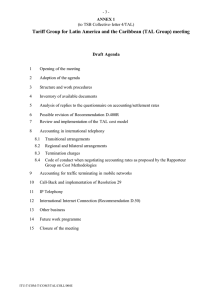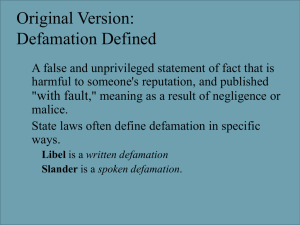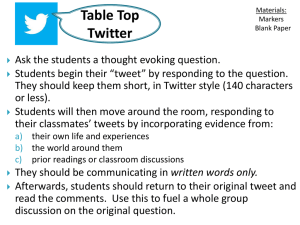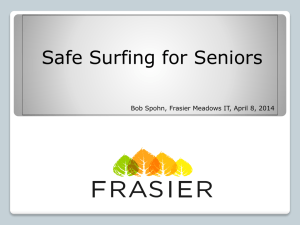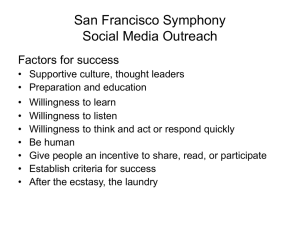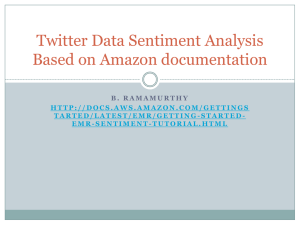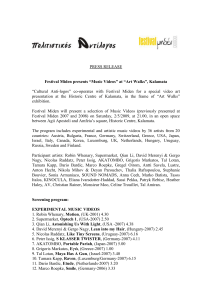LEGAL ISSUES IN SOCIAL MEDIA Presented by
advertisement
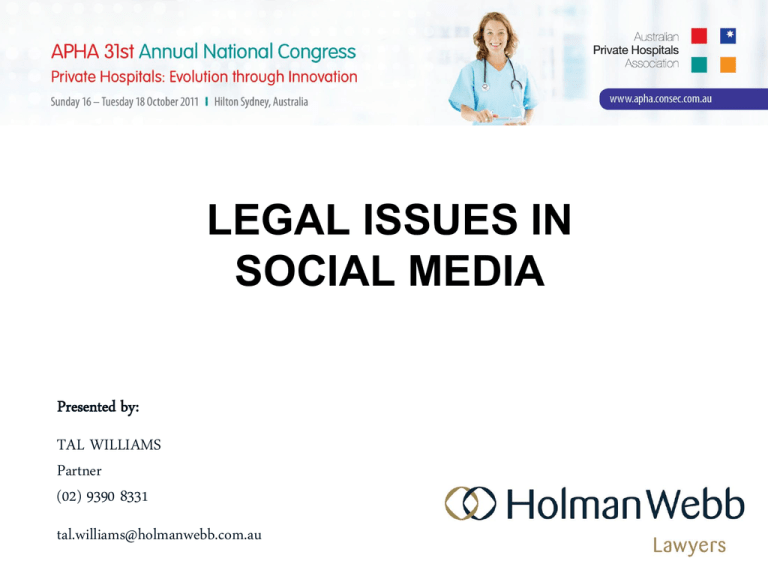
LEGAL ISSUES IN SOCIAL MEDIA Presented by: TAL WILLIAMS Partner (02) 9390 8331 tal.williams@holmanwebb.com.au • Assumptions • Privacy • Blame • What is social media – Electronic media used for social (and increasingly business) interaction – ie ways to electronically communicate with the world • Facebook, My Space, Youtube, Twitter • Linked-in, Google (and other) business directories • Blogs • Interactive Web sites • Emails, texts, MMS • Smart phones and apps • How is social networking being used? – Is it still the domain of teenagers and 20 somethings for social gossip, an open personal diary and an outlet for angst and frustration? Or is it becoming an effective business tool? – What are the legal implications of social networking activities • The positives – You can monitor your brand – You can disseminate information quickly – You can use it as a educational or promotional platform – You can address negative comments and deal with problems early • Things you must have in place – A purposeful and directed strategy – Usage guidelines – Terms and conditions including disclaimers – Employee compliance policies – Strong and enforceable privacy rules and processes • Remember, at law: – Violation of your professional, social or ethical obligations in the health environment on line or via twitter is no different to violation of those obligations in any other way. You must monitor and control social media in the same way you monitor and control all other conduct – Legal risks in use of social media – Patient and hospital confidentiality/privacy – Intellectual property (copyright/trademark infringement) – Misleading and deceptive conduct – Defamation – Criminal conduct – Creating binding contracts – Evidence – Complaints and inquiries • Patient and hospital confidentiality/privacy – Staff re patients – Staff re hospital – Staff re other staff – Patients re hospital – Patients re staff – Patients re other Patients • Intellectual Property – Copyright – CAL issues and use of photo’s – Design – Trademarks – Confidential information and know how • Defamation – Younger staff may see the internet/twitter world generally as a ‘private adolescent place’ and a forum for whatever they want to say – even a replacement for the old fashioned diary – But the net is a form of open publication • Defamation - Blogging – I just provide the service to my members – I am not responsible for what they say – and my terms and conditions of use do not allow them to be defamatory or offensive…so it isn’t my problem? • Litigation on the way… • “Clearly [name] doesn’t know what she is doing” • Being cc’ed on an inappropriate email were enough for defamation action to commence • Reliance on an out of date website • Implicit racial slur in a blog • In Australia – staff comments on patient conduct (made on twitter, at home, after hours,) has caused material issues for providers • Misleading and Deceptive Conduct – The same principles apply to misrepresentations on a website [or in social media] as apply anywhere else in the public domain. – A lie is a lie – and the fact that it is on your website, in a blog, sent via a tweet or intended to be private is irrelevant. • Criminal Conduct – Subdivision C of the Criminal Code – General offenses relating to the use of Telecommunications • You commit an offence if use a carriage service in a way that a reasonable person would regard as menacing, harassing or offensive, or to make a threat, plus many others (Section 474) • Penalty: 3 years jail • Creating Binding Contracts – Could your (or your staff’s) use of social media bind you or our organisation to a contract? • Click wrap agreements • Browse wrap agreements • Exchange of emails • Procedural legal matters – Evidence in legal cases • OH&S Claims • Employment – Dismissal – Sick leave claims – Employee attitude – Serving Legal documents • So what do we do? – Where you host or manage a website.. – Have click wrap terms and conditions of use – Set up monitoring arrangements for blogs (NB there are automated response programs to assist) – Regular updates to ensure information current – Policies and procedures for your staff – Daily review • So what do we do? – Where your staff use social media. • Create and enforce policies to cover: – What online presence is acceptable – Email use protocols – What sites (or types of sites) will be blocked – Training and awareness – Prohibition on using blogs at work – Creation/involvement/authority • So…. – Assess the value of Social Media to your hospital and market – Do a risk analysis – Determine what strategy to adopt (if any) – Put the necessary controls in place – Implement a rigid training/awareness regime – Monitor very closely LEGAL ISSUES IN SOCIAL MEDIA Tal Williams Partner Holman Webb Level 17, 123 Pitt Street Sydney NSW 2000 Tel: 02 9390 8331 Email: tal.williams@holmanwebb.com.au Disclaimer: Nothing in this Presentation should be taken as legal advice and it is strongly recommended that legal advice be sought in relation to any particular document, issue or matter.
